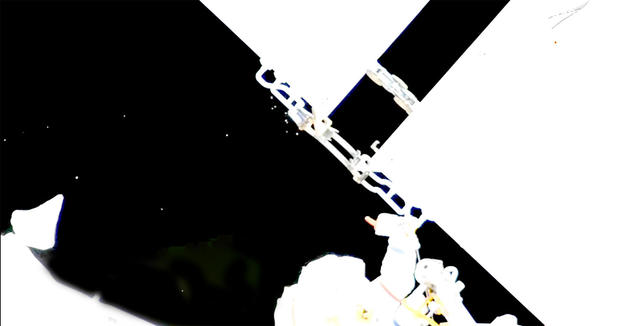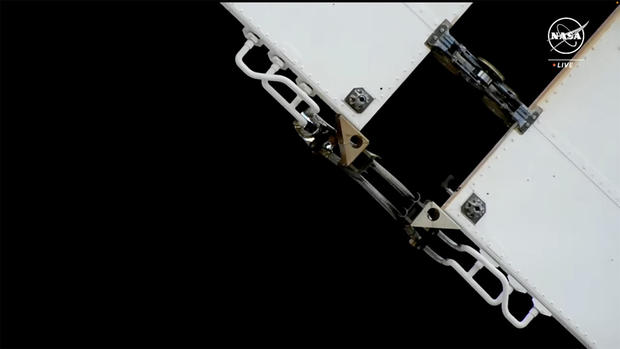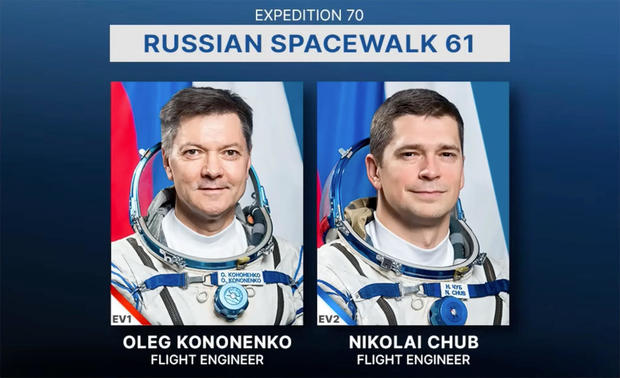Two Russian spacewalkers floated outside the International Space Station Wednesday and isolated a leaking radiator as planned, apparently causing residual coolant still trapped inside to make its way to the leak site and spew out into space.
Cosmonaut Oleg Kononenko planned to sop up the pooling coolant with a cloth towel, but was told to leave the area immediately when he reported some of the liquid had made it onto a safety tether. He said none had reached his suit.

The tether was secured in a sealed bag, and the crew was not in any danger from the coolant. Procedures were in place to make sure their spacesuits were clear of any such contamination before they re-entered the space station.
In the meantime, Kononenko and crewmate Nikolai Chub pressed ahead with work to attach a small synthetic aperture radar instrument to the hull of the Nauka module, to deploy a mini satellite to test solar sail technology and, if time is available, replace an electrical connector panel.
Kononenko, making his sixth spacewalk, and Chub, making his first, began the excursion at 1:49 p.m. EDT when they opened the side hatch of the Poisk airlock compartment to the vacuum of space.
The radiator in question was launched with the Russian Rassvet module aboard the space shuttle Atlantis in May 2010. The radiator and a small experiment airlock remained stored on Rassvet until earlier this year when spacewalking cosmonauts attached both to the Nakua multi-purpose laboratory module.

The radiator's installation went normally and valves were opened to route coolant from Nauka into its unfolded panels. But on Oct. 9, flight controllers noted flakes streaming from the area of the radiator. The flakes turned out to be frozen coolant that was spewing overboard.
Kononenko and Chub planned to spend about three hours documenting the positions of coolant loop valves, adjusting them to isolate the radiator from supply lines and photographing the leak site to help engineers figure out what caused it.
Kononenko initially reported "the radiator is clean. I don't see anything ... I do not see any traces of coolant."
But he reported numerous "black spots" on one radiator panel and after the valves used to isolate the radiator from its coolant lines were adjusted, droplets of coolant could be seen leaking from a line connecting two radiator panels.
The droplets combined to form a fairly large bubble around the leaking coolant line. Kononenko said the bubble was too large to sop up with the towel he had planned to use.
What might have ruptured the coolant line was not immediately known.

It was the third coolant leak in less than a year for the Russians, starting with a massive rupture that disabled a Soyuz crew ferry ship last December. A similar leak developed on an unpiloted Progress cargo carrier earlier this year.
The presumed cause of the Soyuz leak was a micrometeoroid impact. The Russians have not addressed the possible cause of the Progress leak or the one affecting the Nauka radiator. But it seems extremely unlikely micrometeoroids could have caused three such incidents in similar systems.
In any case, shortly after the latest leak occurred, Russian space agency Roscosmos said in a post on Telegram that the lab's primary coolant loop was not affected and "the crew and the station are not in any danger."
Kononenko and Chub were not planning any sort of repair. Their primary objective was to find and document where the leak might have originated and to isolate the radiator from coolant supply lines to prevent any future problems.
- In:
- Spacewalk
- International Space Station
- Space
- NASA

Bill Harwood has been covering the U.S. space program full-time since 1984, first as Cape Canaveral bureau chief for United Press International and now as a consultant for CBS News. He covered 129 space shuttle missions, every interplanetary flight since Voyager 2's flyby of Neptune and scores of commercial and military launches. Based at the Kennedy Space Center in Florida, Harwood is a devoted amateur astronomer and co-author of "Comm Check: The Final Flight of Shuttle Columbia."
Thanks for reading CBS NEWS.
Create your free account or log in
for more features.


